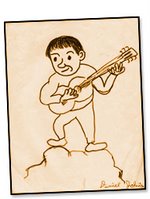
Though this film is one of the best documentaries I have seen in some time, I feel inclined to persuade you to see this movie more than just discuss its artistic qualities or successes. The best way I can convince you seems to be by sharing with you exactly what I learned through becoming a witness to Daniel’s story. Three things continue to grip me about his story.
First, I don’t think I will ever envy the life of the artist to quite the same degree again. Historians and commentators can argue incessantly about the extent to which artists invite upon themselves the constraints of alienation and isolation that satisfy the tired pattern of the ‘tortured artist.’ In the life of Daniel Johnston, that unfortunate dynamic evolves into a critically dangerous, almost murderous, mechanism. It seems that Daniel’s life was fraught by two mutually harmful adversaries, and I am not suggesting here that Satan was one of them—though he may prove a suitable third. On one side, Daniel’s family provided the consistently narrow-minded and unsupportive atmosphere, just the sort that most artists love to rebel against. On the other side, the ground-breaking intelligentsia of underground music never missed an opportunity to celebrate Daniel’s savage genius to the point of aiding and abetting the mad scientist in too many unfortunate episodes. Why does the artist’s age-old stigma as ‘outsider to normality’ remain both an easy target for some and a campaign banner for others?
Secondly, I don’t want say that the Devil is real anymore and seemingly live like he’s not. It seems clear to me that no Christian person that learns about Daniel’s story can view their own beliefs about Satan with the same passivity. I don’t wish to speculate about the causes or conditions that contributed to the extreme nature of Daniel’s mental breakdowns and grand delusions. His great quest to defeat the Devil, however, may be able to tell us something about the discrepancy between Armageddon as described by Scripture and the way some Christian contingents apply that apocalyptic content toward a particular agenda. I can understand how Daniel would take up his quest in light of the fact that apocalyptic dramas are played out through Sunday sermons in many churches week after week with little effect. Could Daniel Johnston be the most heroic/tragic casualty in the current American culture wars?
Lastly, I don’t want to forget the simple power of happy endings. Daniel’s story is the sort of tragedy that you wish you could turn away from—grimacing as each turn from the better is quickly squandered. But in the end the drama is just too mesmerizing to deny. After the academic appeal of viewing both his artwork and songs as ‘outsider art’ wears off, our attention holds on the intimate connection between the sheer vulnerability of his plaintive ballads and the desperately sad tale of an artist that can now only sing from his heart. Daniel’s story has no happy ending, especially to the degree that he and his family deserves, but there have been small miracles along the way that help to keep his art hopeful. And it is no small miracle that his story has been made available to the rest of us. Without its honesty and authenticity, many people—myself included, would likely never see the wonder in their own stories and lose their hope in what matters most in life. Daniel reminds us so well that “True Love Will Find You in the End.”

View trailer here.